There are perfectly legitimate reasons not to have read works widely regarded as science fiction and fantasy classics. Perhaps the most compelling is that the field is far too large for any one person to have read all of it, even if they were to limit themselves to works other readers enthusiastically recommend. However, there are other reasons, some quite silly, to have left promising books unread. Here are five of my stupidest reasons for not having read a widely-praised book cover to cover.
Always Coming Home by Ursula Le Guin (1985)
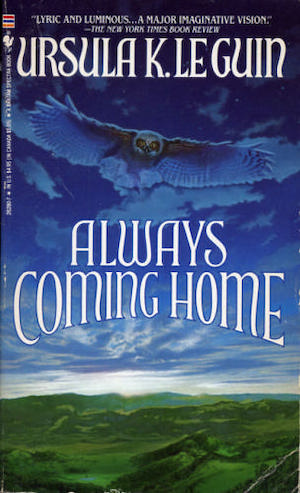
Always Coming Home is a fictional anthropologist’s account of the Kesh, a pacifistic, low-environmental impact society of a very distant future. Superficially primitive, they have a sophisticated toolkit which they to apply in ways very different from standard 20th century operating procedures.
This sort of thing is my delight, at least in the context of roleplaying games. I own shelves of Traveller books detailing futuristic societies. I own the massive two-volume set Glorantha source book. I have bookcases full of roleplaying settings. But…package this sort of speculation into a novel and for some reason I cannot connect. I’ve owned this book for thirty-six years and have never gotten past the first chapter. In fact, my memory is so resistant to the work that I own several copies; I kept forgetting that I already owned it and buying another one.
***
Nightside the Long Sun by Gene Wolfe (1993)
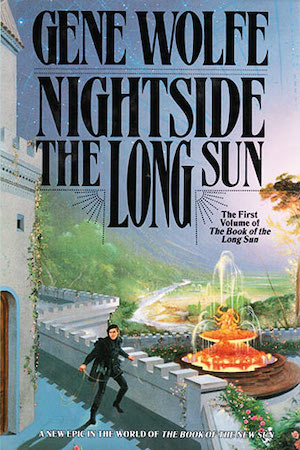
First novel in the The Book of the Long Sun series, sequel to the award-winning Book of the New Sun, this book recounts the beginning of an epic quest set within a vast generation ship. It is full of sophisticated allusion and written in award-winning prose. Or so I gather, because I have never read it.
Wolfe was famously literarily ambitious in a way that few SF authors are. My sensibilities have been honed on, uh, considerably less ambitious works. I am painfully aware that were I to attempt any discussion of Long Sun, my attempts would likely resemble someone trying to discuss a famous painting, like Turner’s The Fighting Temeraire, tugged to her last Berth to be broken up, 1838, by commenting on the painting’s frame. Developing the skills to read Wolfe would be taxing and success is not guaranteed; thus I avoid the work.
***
Swordspoint by Ellen Kushner (1987)
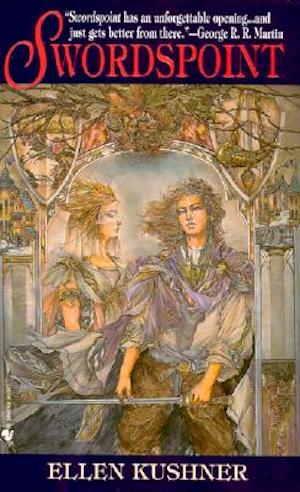
The first novel in Ellen Kushner’s secondary-universe melodrama-of-manners Riverside series, Swordspoint details the efforts of the astonishingly short-sighted Lord Horn to force Richard St. Vier—arguably the deadliest duelist in Riverside—to accept a contract St. Vier rejected as beneath him. Other people might hesitate to infuriate a man whose primary skill is murder but not Lord Horn. Who, by the way, is unlikely to appear in sequels to Swordspoint.
Despite having owned a copy of the mass market paperback since it was released, I did not read this because I somehow convinced myself I’d already read it. It would be nice to say I’d somehow confused it with Melissa Scott’s 1995 Point of Hope but since I didn’t read Point of Hope until 2017, that’s impossible. I did at least discover my error and rectify my oversight.
***
In Conquest Born by C. S. Friedman (1987)
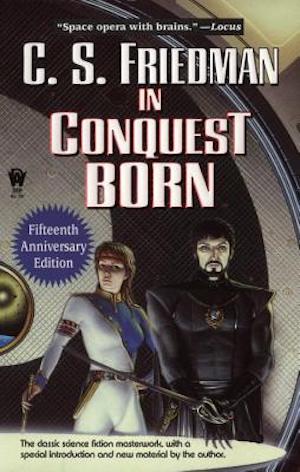
The Azean Empire has the misfortune to border territory claimed by incessantly warlike Braxi. Azea and Braxi have signed a multitude of peace treaties, each one worthless as soon as the Braxi find an excuse to restart hostilities. In Anzha, Azea has a champion who might lead Azea to victory over Braxi. Pity that the Empire is steadfastly racist and Anzha manifests a forbidden phenotype.
It happens that my brain is really good at associating events that I experienced in the same timeframe, events that were otherwise completely unrelated. Thus, if I walk by a specific location near the corner of University Avenue and Seagram Drive, I think of Niven’s All the Myriad Ways; if I walk through the right section of the University Waterloo Bookstore, I think of the Pyramid edition of the Lensmen books. In the case of C. S. Friedman’s In Conquest Born, I attended a party a couple days after I destroyed my knee and then stubbornly walked around on it for a day. The party was crowded, and as I discussed In Conquest Born with an avid fan of the work, people kept jostling my injured leg. To this day, any mention of In Conquest Born makes my left leg ache from hip to foot. I did eventually manage to read it despite this distraction…in 2019.
***
The Quiet War by Paul McAuley (2008)
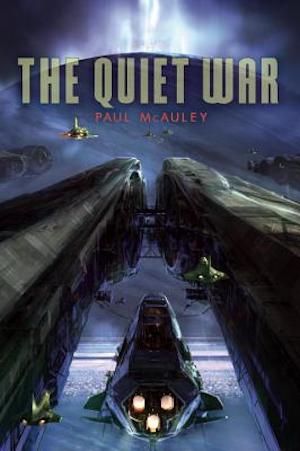
This is the tale of a total war. On one side, the Outers who having developed the means to live in the outer Solar System, have created a flourishing community in that bleak realm. On the other, Greater Brazil, a corrupt ecostate whose self-serving oligarchs regard the Outers as an ideological affront and resolve to carry out a bold land-grab.
When this novel appeared, there were not many new SF books set in the Solar System. Certainly, there were not many whose authors tried as hard as McAuley to create a plausible hard SF setting without the usual shortcuts like implausibly efficient fusion drive. If you know me, you might guess that I fell hard for this book.
I didn’t. I had first read the sequel, Gardens of the Sun, which means I know how The Quiet War has to end. The sequence is a lot bleaker than anything I cared to read back in 2008. I own the whole series but my tolerance for unrelenting grimness is if anything even less than it was. I have no idea when or if my copies will get read.
***
There are other ludicrous reasons not to have read books, reasons I didn’t have space to cover—reasons such as cover art too embarrassing to be revealed in public. Perhaps you too would like to tell us why you haven’t read something that you, as a sophisticated reader, should have read. If so, comments are below.
In the words of Wikipedia editor TexasAndroid, prolific book reviewer and perennial Darwin Award nominee James Davis Nicoll is of “questionable notability.” His work has appeared in Publishers Weekly and Romantic Times as well as on his own websites, James Nicoll Reviews and the Aurora finalist Young People Read Old SFF (where he is assisted by editor Karen Lofstrom and web person Adrienne L. Travis). He is a four-time finalist for the Best Fan Writer Hugo Award and is surprisingly flammable.










